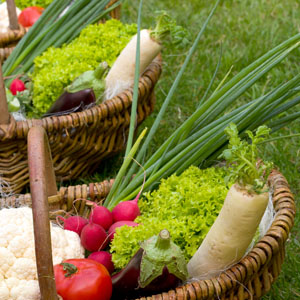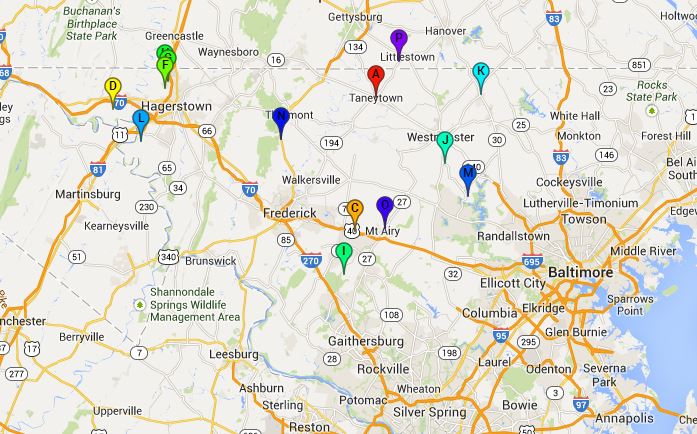News |
News |
|
by Kristina Bostick An article on Peterson Co.'s project "drying up in response to clean water controversy" came out from the Post and has been picked up elsewhere
by Caroline Taylor  Community Supported Agriculture CSAs can take many forms, but essentially they are community supported farms in which members contribute to farming projects, usually by way of membership fees, in exchange for fresh, local produce. The concept came to the United States from Europe in the 1980s and has taken strongest hold in New England, the Mid-Atlantic region, and various pockets along the West Coast. They are a great way to take advantage of fresh, locally grown fruit, vegetables, herbs, and more while supporting nearby farms. Each one is different, some offer pickup locations in urban areas, some offer only farm-based pick ups. See the list below for local CSAs and find one that is right for you. Learn more! Sign up! by Kristina Bostick Last week, a joint committee of Councilmembers approved a plan that provides protection for fragile Ten Mile Creek and the Little Seneca Reservoir which it feeds (backup water supply for you, me and 4.3 Million in the DC area). Called the "6-15-15 solution" , the joint committee’s plan allows significant residential and commercial development within Clarksburg Stage 4, while setting strict limits on imperviousness, in order to limit future additional damage to Ten Mile Creek. More on the plan here. We support this compromise plan but mitigation criteria (ex- forested buffers to protect wetlands) are an essential addition to properly protect the water supply. A full Council vote that was slated for next week has now been delayed to March 4, among other efforts to derail the process.
That's why we are asking, one more time, for you to contact the Council and get the job done. Click here for a sample email and Council contact info. by Kristina Bostick  See Press Release Here Click the map above to go to the interactive version. When we convene with Farmers, either face to face or through our Producers Listserve. Some of the same challenges are shared again and again - the sky high price of land, which has lead to our Land Link program, and the lack of processing options in the local area. The first step to overcoming any challenge is collecting data and we were fortunate to have the help of our intern Todd Langstaff. Todd's research on local processing options has yielded the map above (click on map to go to interactive version) on what can be processed where. If you know of more slaughter facilities that would like to be added, let us know - [email protected] We also have farmer recommendations for local label making companies for when it is time to label the final product: Hub Labels of Hagerstown Gateway Printing of Thurmont. The few facilities on the map close to the Ag Reserve that process non-game meats are in high demand and have long waiting periods. Local farmers have told us that driving animals farther afield is not just inconvenient but puts unnecessary stress on the animals.
New Map Resource for Local Farmers Released: Reveals Need to Expand Services for Meat Production
Montgomery Countryside Alliance (MCA) has released a map of regional meat processing locations in an effort to document current service levels and show potential for more processing locations. See the map larger here
“Our local livestock producers have been frustrated with the lack of nearby meat processing and packaging services and have cited long drives and wait times that put undue stress on their animals,” says Caroline Taylor, MCA’s executive Director. The map, compiled by MCA intern Todd Langstaff, shows that while farmers located closer to the metro areas certainly benefit from increased demand for local food, the resources they need to get that food to market are much further afield. To maintain current farms and build the next generation of farmers, removing this sort of bottleneck from the farm to market system is an important step.
MCA was a proud lead organization of the January 2013 Farming at Metro’s Edge (FAME) conference which gathered farmers, educators, environmentalists, local officials and residents to chart a course for a strong Ag. sector and local food system in Montgomery and Frederick Counties. The FAME report highlighted a number of ways to increase farmer profitability and local food production- including increased resources for Ag Extension services and better Ag Education for students and the general public. Specific challenges were also identified for small scale table crop and meat producers. Currently, MCA is answering local land acquisition challenges with our Land Link program and the meat processing map represents another resource intended to help farmers find the tools to maintain farming as a way of life and a career in our metro region. Greg Glenn of Rocklands Farm commented, “as farmers, our time is so completely occupied with… farming. Having these types of resources available is so valuable.” The strength of our local food system depends on collaboration and MCA continues to partner with farmers, consumers and local organizations to build on the findings of the FAME report and grow both our cities and our food in balance. |
Categories
All
Archives
June 2024
|
|
MCA is proud to announce that we have been recognized for a third time as one of the best small charities in the D.C. region by Catalogue for Philanthropy: Greater Washington. A panel of 110 expert reviewers from area foundations, corporate giving programs, and peer non-profit organizations evaluated 270 applications.
MCA is known as an effective and innovative non-profit whose efforts to preserve and promote Montgomery County’s nationally recognized 93,000 acre Ag Reserve have brought increased public and governmental support of local food production and farmland and open space preservation. Most importantly, MCA’s efforts are putting more farmers on the ground and keeping them there. |